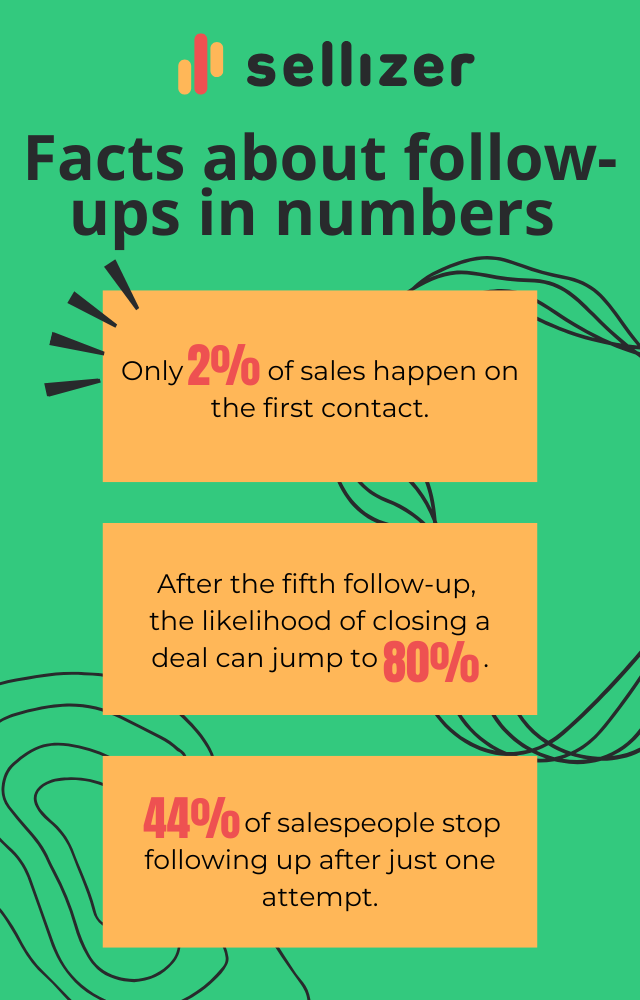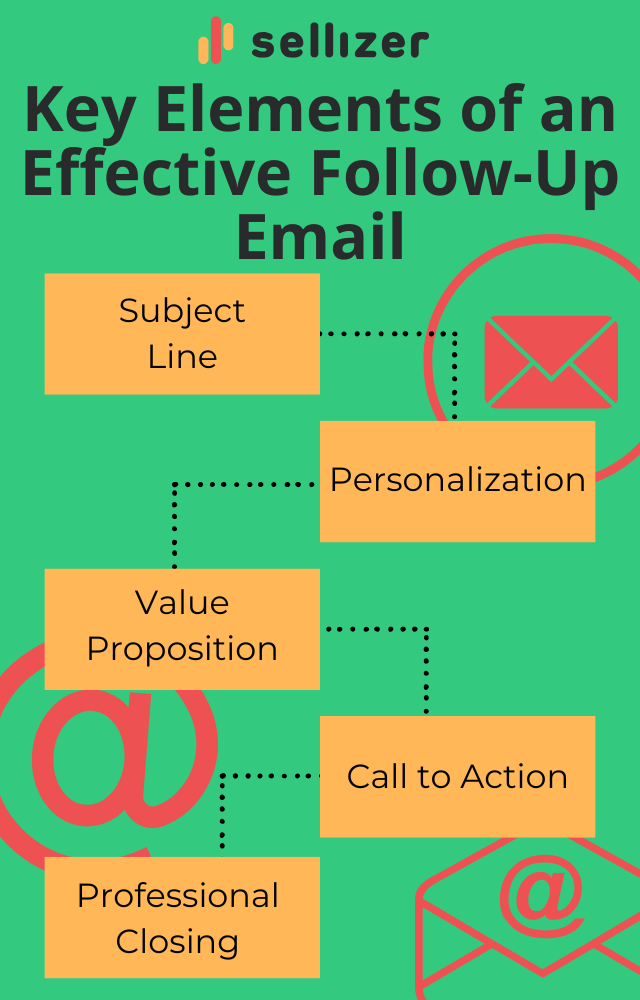Mastering the art of follow-up can mean the difference between closing a deal and losing a prospect. Effective follow-ups not only help convert leads into sales but also build lasting relationships. This article dives into why follow-ups are essential for startup sales success and how to do them right.
Why Follow-Ups Are Essential for Startup Sales
In the fast-paced world of startups, follow-ups are not just a courtesy; they are a necessity. Effective follow-ups can significantly boost your chances of closing deals and converting leads into loyal customers. Without them, there is a risk of losing potential sales, which could hinder the growth of startups.
The Impact of Follow-Ups on Conversion Rates
Follow-ups play a crucial role in increasing conversion rates. Research shows that only 2% of sales happen on the first contact. However, after multiple follow-ups, the chances of making a sale can rise dramatically. For instance, after the fifth follow-up, the likelihood of closing a deal can jump to 80%. This highlights the importance of persistence in sales.
Building Strong Relationships Through Consistent Follow-Ups
Consistent follow-ups help in building strong relationships with potential customers. When you reach out regularly, it shows that you care about their needs and are willing to assist them. This can lead to trust, which is essential in any business relationship.
A simple thank-you email or a check-in can make a big difference in how prospects perceive your startup.
The Cost of Neglecting Follow-Up Emails in Startup Sales
Neglecting follow-up emails can be costly for startups. Many sales are lost simply because sales reps give up too soon. In fact, 44% of salespeople stop following up after just one attempt. This means that a significant number of potential customers are left unattended, which can hinder growth and revenue.
Regular follow-ups are not just about persistence; they are about showing your prospects that you value their time and interest.

Best Practices for Effective Follow-Ups in Startup Sales
Implementing effective follow-up strategies can significantly enhance your chances of closing deals and building lasting relationships with clients.
Timing Your Follow-Ups for Maximum Impact
Timing is everything when it comes to follow-ups. You want to reach out when your prospect is most likely to engage, which means avoiding both too early and too late. A good rule of thumb is to follow up within a few days after your initial contact, but be mindful of your prospect’s schedule. If they mentioned being busy, wait a bit longer. This balance shows respect for their time while keeping you on their radar.
Crafting Personalized Follow-Up Emails That Get Responses
Personalization is key in follow-up emails. Instead of sending a generic message, tailor your email to address the specific needs and interests of your prospect. Mention something from your last conversation, or include relevant information that could help them. This approach not only shows that you care, but also increases the likelihood of a response.
Remember, a personalized email can make all the difference in a crowded inbox.
In summary, effective follow-ups in startup sales require careful timing and a personal touch. By being strategic and thoughtful in your approach, you can significantly improve your chances of success.
Tools and Strategies for Streamlining Follow-Ups in Startup Sales
Utilizing the right tools and strategies can help streamline the process of building positive customer relationships, making it easier to stay connected with potential clients.
Automating Follow-Up Emails to Increase Efficiency
Automation is a game-changer for startups looking to enhance their follow-up process. By using automated email tools, sales teams can send timely follow-up emails without the need for manual effort. This not only saves time but also ensures that no lead is forgotten. For instance, tools like Sellizer allow users to set up automated sequences based on recipient behavior, ensuring that follow-ups are relevant and timely.
Using CRM Systems to Manage Client Emails and Follow-Ups
Customer Relationship Management (CRM) systems are essential for managing client interactions. They help organize all communications in one place, making it easier to track follow-ups and client responses. A well-implemented CRM can provide insights into client behavior, allowing sales teams to tailor their follow-up emails effectively. This centralized approach ensures that all team members are on the same page and can access important client information quickly. You can easily integrate with popular CRMs like Pipedrive, Livespace, and Bitrix24.
Tracking the Success of Follow-Ups in Startup Sales
Monitoring the effectiveness of follow-up emails is crucial for continuous improvement. By analyzing metrics such as open rates and response times, startups can refine their follow-up strategies. Regularly reviewing these metrics helps identify what works and what doesn’t, allowing teams to adjust their approach accordingly. This data-driven strategy not only enhances follow-up success but also contributes to overall sales performance.
Implementing these tools and strategies can significantly improve your follow-up process, leading to better relationships with clients and increased sales success.
How to Write a Follow-Up Email for Startup Sales Success
A well-crafted follow-up email not only reminds your prospect of your previous conversation but also adds value to their decision-making process.
Key Elements of an Effective Follow-Up Email
When writing a follow-up email, there are several key elements to keep in mind:
Subject Line: Make it clear and concise. An effective subject line grabs attention and sets the tone for your email.
Personalization: Address the recipient by name and reference your previous interaction. This shows that you value their time and are genuinely interested in their needs.
Value Proposition: Remind them of the benefits of your product or service. Highlight how it can solve their specific problems.
Call to Action: Encourage the recipient to take the next step, whether it’s scheduling a call or replying to your email.
Professional Closing: End with a polite closing statement and your contact information.
Sample Email Templates for Startup Sales Follow-Ups
Here are a couple of sample email templates you can use as a starting point:
Template 1: After Initial Contact
Subject: Great Connecting with You!
Hi [Name],
I hope this message finds you well! I wanted to thank you for our conversation about [specific topic]. It was great to hear more about your needs and goals. I believe our [product/service] can really help you with [specific problem].
Would you be open to discussing this further? Let me know a time that works for you!
Best,
[Your Name]
[Your Contact Information]
Template 2: After No Response
Subject: Just Checking In
Hi [Name],
I wanted to follow up on my previous email regarding [specific topic]. I understand you might be busy, but I truly believe our [product/service] can make a difference for you.
If you have any questions or need more information, feel free to reach out!
Looking forward to hearing from you,
[Your Name]
[Your Contact Information]
Remember, persistence is key in sales. Following up can often lead to a response when you least expect it.
Conclusion: Making Follow-Ups a Core Part of Your Startup Sales Strategy
In conclusion, following up is a key part of making sales in startups. It’s not just about sending one email and waiting for a reply. Many customers require reminders and more information before they decide to buy. By reaching out again, you show that you care and are serious about helping them. This can make a big difference in turning a potential customer into a real one. So, always remember to follow up, be patient, and keep the conversation going. Your efforts will pay off!

Frequently Asked Questions About Follow-Ups
Why are follow-ups important for startups?
Follow-up emails help keep your business in the minds of potential customers. They can turn a ‘maybe’ into a ‘yes’ by showing that you care.
How often should I follow up with a lead?
It’s good to follow up multiple times. Many sales take five or more tries to get a response.
What should I include in a follow-up email?
Make sure to thank them for their time, remind them of your conversation, and suggest the next steps.
Can I automate my follow-ups?
Yes! There are tools available that can help automate follow-up emails, saving you time.
What if I don’t get a response after several follow-up email?
If you still don’t hear back, it might be time to move on. However, you can ask if they need more information.
How do follow-ups build customer relationships?
Regular follow-up emails show that you care about your customers, helping to build trust and loyalty.



